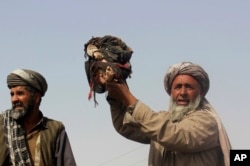Afghan and international forces had killed more civilians than insurgents in the first three months of the year, the U.N. announced Wednesday, the first time the deaths caused by the government and its allies exceeded their enemies.
Still it was insurgents who were responsible for the majority of dead and wounded civilians combined, according to the U.N. Assistance Mission in Afghanistan's report, which was released in Kabul.
The report said 1,773 civilians were hurt or died in the first three months, which is a significant drop from the same period last year when 2,305 civilians were killed or wounded. Last year, many brutal suicide bombings were blamed for the high casualties.
Between Jan. 1 and March 31, the report said 581 civilians were killed and 1,192 were hurt. While insurgents caused a significant majority of the injuries, it was pro-government forces, including NATO, which killed the majority of civilians. They were responsible for 305 civilian deaths, nearly half of them in airstrikes. The other heavy death toll took place during searches, according to the report.
At the same time, the government and international forces injured 303 civilians, compared to insurgent attacks that injured 736, the report said.
It's the first time since 2009, when the U.N. began compiling statistics on civilian casualties, that the deaths as a result of actions by the government and its allies exceeded their enemies.
Most of the deaths were the result of aerial attacks, which were most often carried out by international forces. While the report does not identify the United States, it is the U.S. that carries out airstrikes when called in to assist Afghan forces. It also follows a trend reported in last year's U.N. annual report on civilian casualties, which showed a dramatic hike in civilian deaths by pro-government forces including more than 1,000 civilian casualties from airstrikes, the highest since the U.N. began keeping track 10 years ago.
In September last year, Masih Rahman's entire family of 11 - his wife, four daughters, three sons and four nephews - were killed when a bomb flattened their home in Mullah Hafiz village in the Jaghatu district of Afghanistan's central Maidan Wardak province.
"It's not just my family, there are dozens of families just like mine who have been lost in bombings,'' he said in an interview on Tuesday.
Rahman was working in Iran when he was told his entire family had been killed in an airstrike on his village, which is controlled by the Taliban. Rahman has sought redress from the United Nations. He has taken his case to Afghanistan's Independent Human Rights Commission, which put out its own report on civilian casualties on Tuesday.
In that report, the commission said 11,212 civilians were hurt or wounded between March 31, 2018, and March 31 this year. In just the last 10 years of Afghanistan's 17-year war, the commission said 75,316 Afghan civilians had died.
"A shocking number of civilians continue to be killed and maimed each day,'' said Tadamichi Yamamoto, the U.N. secretary-general's special representative for Afghanistan.
He said that anti-government elements need to stop deliberately targeting civilians and using improvised bombs, which cause indiscriminate harm, while pro-government forces are called upon "to take immediate measures to mitigate the rising death toll and suffering caused by airstrikes and search operations.''





